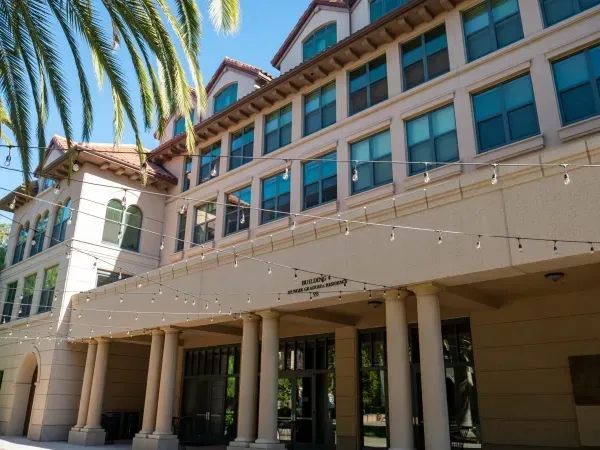Since 2020, Stanford has claimed to offer a five-year guarantee of funding for all Ph.D. students in good academic standing. If you’re like most graduate students, however, you probably know someone whose access to funding has been far from “guaranteed.” Stanford’s processes behind the enforcement of its guarantee are opaque, arbitrary and clearly broken. We at the Stanford Graduate Workers Union (SGWU) have been negotiating our first contract with Stanford for close to a year now. Throughout this process, we have continued to reiterate, despite Stanford’s continuous denial, that a funding guarantee enshrined in our contract is a right of every Ph.D. student at Stanford.
Through a range of sources — advisor grants, fellowships, departmental funds and Vice Provost for Graduate Education (VPGE) funding — Stanford argues that it offers a reliable funding guarantee. Yet many graduate workers across Stanford have shared their experiences of being left without funding and scrambling to change advisors and labs. To make matters worse, in many of these cases, students’ departments often made little or no effort to help them through their ordeals.
Through the testimonials of, and further conversations with, graduate workers, SGWU organizers have heard many harrowing tales of this kind. It is a common experience, indeed, for graduate workers to have had to switch labs or even drop out of Stanford altogether after the sudden and unexpected drying up of funds. In fact, one such lab saw all its graduate workers leave once grants ran out. Other workers have said they felt at risk of being pushed out of Stanford after their rotation labs experienced unanticipated research assistantship demand or loss of funded projects. Instead of ensuring that their workers received funding, these departments instead recommended they either go unfunded for a quarter, or seek hourly jobs while on a leave of absence. It was only with SGWU’s help that the workers were able to petition their departments and VPGE for those funds.
Unfortunately, success in the petition process is not guaranteed. One worker who had joined a financially struggling lab said she considered rotating elsewhere to stay funded while searching for new grants. Her department rejected her request to reach out to the VPGE, asserting that the funds had “not yet been set aside” even though Stanford had already claimed they existed. Instead, the worker was forced to join a lab with no relation to her program, and ultimately had to leave Stanford as a result.
These workers’ experiences expose the complete lack of transparency and accountability behind Stanford’s funding guarantee. When Stanford fails to uphold its commitment, the graduate worker has no real recourse at hand. We at SGWU seek to ensure this recourse for all graduate workers. With guaranteed funding in the contract, a union representative could assist any graduate worker seeking funding at every stage of the process, from attending meetings with university administrators, to advocating for the graduate worker, to escalating if the funding issue is not resolved in a timely manner. This is the power of a union contract — we can stand up for each other directly, and make sure that every Ph.D. student who comes to Stanford can remain here and carry out the research they came here to do.
In bargaining sessions, Stanford has continuously claimed that guaranteed funding is an academic, rather than a labor, issue and that they are not required to bargain on it. As a union, we have continuously rejected this futile distinction. If an advisor denies funding to a fifth-year graduate student in their research group for allegedly “not performing according to expectations,” will that plausibly academic pretext not mask a labor issue? If the advisor wants the student to stay in their group, will the student not be performing unpaid labor? Otherwise, will the student not be laid off from their job? By introducing this confusing distinction, Stanford wants to deny a contract that ensures greater security and equity for graduate workers.
We are not asking Stanford to do something unprecedented. Multiple unions across the United States have won funding guarantees in their contracts. For instance, Dartmouth’s union, GOLD-UE, ratified its contract in June 2024 and in the process enshrined five-year guaranteed funding for all full-time Ph.D. students. Similarly, the contract signed between Johns Hopkins and their graduate union, TRU-UE, offers five-year guaranteed funding to all Ph.D. student employees in their schools of engineering, arts and sciences and medicine. While these contracts have set an example, we believe that Stanford can do even better by offering a more expansive guarantee that equitably covers all graduate programs.
At SGWU, we have consistently strived for a contract that solidifies Stanford’s supposed commitment to financial security and equity for graduate workers. Stanford has consistently shown that their freedom to break their promises matters more to them than our ability to do the work we came here to do. This impasse cannot continue — which is why we must now show Stanford how much it would lose without our work. We are asking you to take the first step and join thousands of your coworkers by signing SGWU’s strike pledge. If you have any questions about what a strike means for you, please read these FAQs (short and long) and feel free to get in touch with your department organizer or Bargaining Committee representative.
Shantanu Nevrekar is a sixth-year Ph.D. student in anthropology. Chris Gustin is a sixth-year Ph.D. student in applied physics. Both are members of SGWU’s Bargaining Committee. Michał Gerasimiuk is a second-year Ph.D. student in computer science and an organizer on SGWU’s Contract Action Team.
